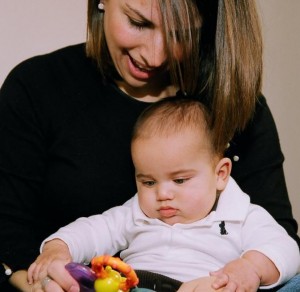Navigating the Early Intervention Process
The Individuals with Disabilities Education Act (IDEA) provides for free speech therapy within the public school system to all children who have a qualifying disability. But what if your child isn’t even in school yet? If you have a child under the age of three and you suspect that he might have a speech disorder, you can have him evaluated and treated with the Early Intervention program.
What Is It?
Under the IDEA law, the Early Intervention program offers a family-based approach to speech therapy. IDEA mandates that professionals work with the entire family to develop solutions.
Early Intervention is similar to special education for older children. However, unlike the IEP for older children, a younger child’s treatment plan will also include recommendations for home-based speech therapy activities.
Who Do I Contact?
While IDEA is a federal law, each state serves as the administrator of Early Intervention within that state. Depending on where you live, Early Intervention may be administered by the education, public health, or social service departments. If you are unsure of which state agency to contact for Early Intervention, check with the National Dissemination Center for Children with Disabilities. Select your state from the checklist to search for the appropriate state agency. You can also call your local school and ask them who to contact.
Screening
Contact the appropriate state agency and request an evaluation for your child under the IDEA. You will likely be assigned a temporary services coordinator, who will conduct a brief screening. He will likely ask you questions about your child’s development. If the coordinator believes that your child might qualify for help under the IDEA, he will give you a referral for an evaluation. By law, the coordinator is required to issue a referral (or deny the request) within two days of the initial contact.
Evaluation
Your child will then be evaluated by a group of professionals. This group will include a speech-language pathologist (SLP). It may also include a psychologist, a pediatrician, an occupational therapist, and other professionals. You will not be charged a fee for the evaluation. The group will examine several different facets of your child’s development, including his cognitive, physical, and social development, as well as his communication skills.
Assessment
If your child is found to have a speech disorder and be eligible for help under the IDEA, the team will then conduct an assessment. During the assessment, the team will discuss your child’s strengths and needs. If you provide consent, the team will also conduct family-directed assessments. This means that they will interview your family members to determine which services might be helpful for supporting the entire family. In doing so, this strengthens your family’s ability to provide support for your child’s progress.
The Individualized Family Service Plan
The team will create a document called the Individualized Family Service Plan (IFSP). This document specifically states your child’s developmental levels and needs, the concerns of the family members, which services your child will receive, and when and where he will receive them. The document will also identify any additional services provided to the family as a whole. These services may include family training and counseling, occupational therapy, audiology services, speech therapy, and assistive technology devices and services.
The IFSP will also briefly outline the steps that will be taken to transition your child out of early intervention when he turns three years old. At least ninety days before your child’s third birthday, an additional, detailed plan will be written that describes the programs for which your child may be eligible.
These Early Intervention services cannot begin until you agree with the IFSP and sign the document to grant your consent. The IFSP will be reviewed at least every six months; however, you may also request an earlier review.





